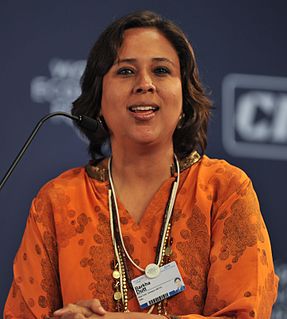A Quote by Barkha Dutt
Hinduism especially - in the absence of codified rituals or a book of rules to circumscribe it - has always functioned as part philosophy, part mythology, leaving it open to competing and contradictory interpretations.
Related Quotes
...there ... remains a huge following [of Ayn Rand's philosophy] of those who ignore the indiscretions, infidelities, and moral inconsistencies of the founder and focus instead on the positive aspects of her philosophy. There is much in it to admire, if you do not have to accept the whole package... Criticism of the founder or followers of a philosophy does not, by itself, constitute a negation of any part of the philosophy... Criticism of part of a philosophy does not gainsay the whole.
We've never pulled from the toy line. We've always pulled from the mythology. What's great is there's so much mythology, so there's always stuff to pull from that. It never lines up perfectly for a movie; it's just like adapting a book or anything else, you know? But you come up with things to create, you come up with different ideas, but fundamentally the ideas always start from the mythology.

































